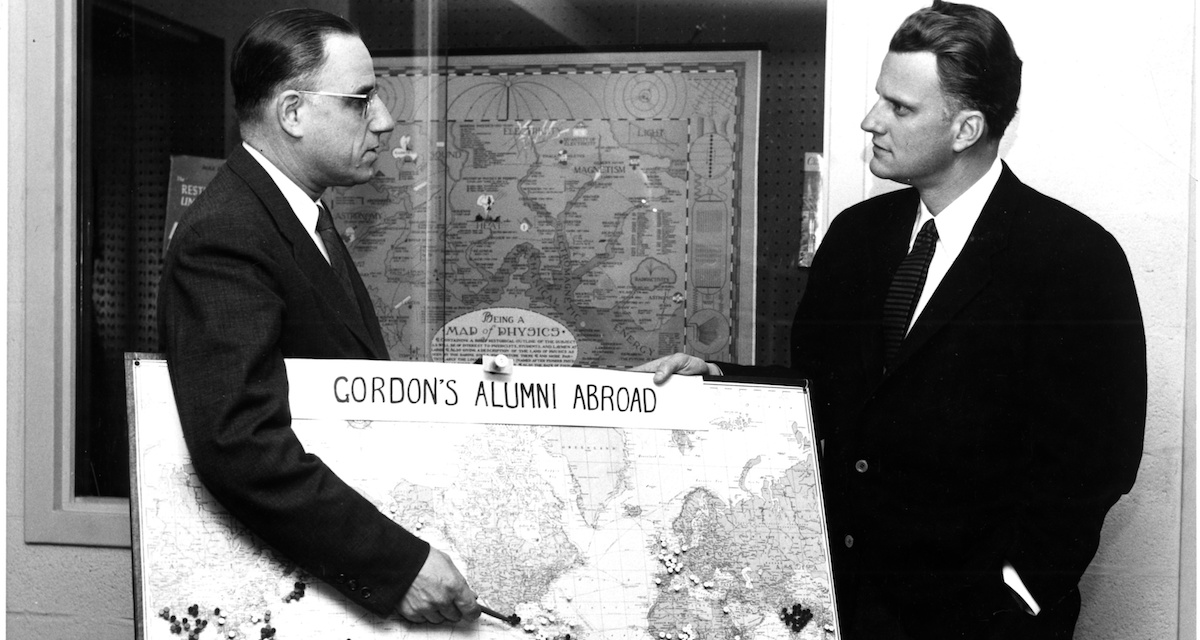Billy Graham’s Mea Culpa to the Jewish Leaders Before His Boston Crusade
On the occasion of Dr. Graham’s death this past Wednesday, Dr. Marv Wilson (biblical studies and Christian ministries) reflected on this story.
Thirty-six years ago, Dr. Marv Wilson was hovering just outside the elevator on the 20th floor of the E.F. Hutton Building, waiting to seize a personal moment with Billy Graham after helping to organize a time for Graham to come meet with Jewish leaders in Boston before his New England crusade on May 30, 1982.
There was a lot leading up to this moment. Wilson had worked to get Dr. Graham to Boston in an effort to help allay Jewish fears concerning the word “crusade.”
“For months I had explored channels to contact Graham so he could speak to the Jewish leadership in New England because Billy Graham held ‘crusades,’ and the word ‘crusade’ is processed quite differently in the minds of Jewish people,” Wilson says. “When they hear the word ‘crusade,’ they often think of the First Crusade in 1096 when Pope Urban II sent crusaders from Europe to Jerusalem, which brought plundering and death to Jews on the crusaders’ journey east.”
Not only that, but when Dr. Graham stepped on the national stage in the late 40s, it was only a few years after World War II had ended—a few years since the Holocaust. Wilson says many Jews asked the question: Can Christians really be trusted? Christians were largely indifferent and silent during the Holocaust years, and this had driven these already disparate communities further apart.
Anticipating how the Jewish people might be affected by Dr. Graham’s New England crusade, Wilson wanted to find a way to get Dr. Graham in the same room as the leaders of Jewish organizations and synagogues located in the Greater Boston area.
Wilson didn’t have access to Dr. Graham, but he knew someone who did: Rabbi Marc Tanenbaum, the very rabbi Wilson had worked with to put together the first national conference of evangelicals and Jews, and the rabbi with whom he co-edited Evangelicals and Jews in the Age of Pluralism and Evangelicals and Jews in Conversation on Scripture, Theology, and History. Because polls held Dr. Graham and Rabbi Tanenbaum among the top four most influential religious leaders in America at the time Rabbi Tanenbaum was able to get Dr. Graham on the phone and convince him to come.
In April of 1982, just weeks before Dr. Graham’s New England crusade, he met with roughly 30 Jewish leaders in a boardroom belonging to a Jewish lawyer who worked on the 20th floor of the E.F. Hutton building in Boston.
The meeting began with an introduction by Rabbi Tanenbaum who made the claim that, without Billy Graham, Israel would have not survived the Yom Kippur War.
In 1973 Israel was attacked on Yom Kippur—their annual day of national fasting. On Yom Kippur, the Jewish people were at the synagogues and were not defending their borders. Golda Meir, the prime minister of Israel at the time, tried reaching out to the White House, but they were unresponsive. Even Henry Kissinger, a Jewish man who was secretary of state, would not answer her calls, so Golda Meir reached out to Dr. Graham because she knew he had access to the White House. Within a day of Dr. Graham’s phone call to the President Nixon, cargo planes left the U.S., flying medical supplies and other essentials over to Israel.
After Rabbi Tanenbaum expressed his gratitude for Dr. Graham’s intervention, Dr. Graham explained the nature of his crusades to the Jewish leaders. He spoke to their concerns and clarified that his crusades do and will not target the Jewish people or any specific group for that matter.
Then, Dr. Graham went on to do something surprising. He did what Wilson describes as a mea culpa. In speaking as a representative of the Christian world as a whole, he apologized for the Church’s alarming silence and inactivity during the Holocaust years. Few had spoken out and few had cared.
In reflecting on Dr. Graham’s corporate admission, Dr. Wilson says, “The Jewish lawyer gets up and I can see tears running down his face. He said ‘Dr. Graham, this has been a catharsis for my psyche—to hear a Christian refer to the silence of the Church during the Holocaust years.’”
“That very much touched this lawyer: to hear someone that was so representative, not just of the American Church,” Wilson says, “but of the Church internationally, acknowledge the Holocaust and that when good people do nothing, evil triumphs.”
Wilson reflects that this “was the moment the penny dropped. The moment of connecting and of hope for more positive relations between church and synagogue in the future.”
After his personal encounter with Dr. Graham in the elevator, Wilson saw him again almost three years later at Harold John Ockenga’s funeral. Ockenga, Gordon’s fifth president and the person after whom Wilson’s professorial chair is named, was a friend of Dr. Graham’s. Ockenga’s friendship brought Dr. Graham to serve on Gordon’s board of trustees for almost 11 years.
Like Wilson’s work to reconcile Jewish and evangelical communities, Dr. Graham and Ockenga put forth the new evangelicalism, which sought not only the redemption of souls, but the engagement of entire communities: evangelical and non-evangelical, black and white and those of different cultures and religious traditions.
Dr. Wilson, Harold John Ockenga Professor of Biblical and Theological Studies, has taught Old Testament, and Hebrew and Jewish Studies at Gordon for more than fifty years. He has worked as an Old Testament translator and editor of the NIV Bible. Today, he is one of the leading global experts on interfaith dialogue and is known for his widely-used textbook “Our Father Abraham: Jewish Roots of the Christian Faith” and its sequel, “Exploring Our Hebraic Heritage: A Christian Theology of Roots and Renewal.”
 The Bell
The Bell